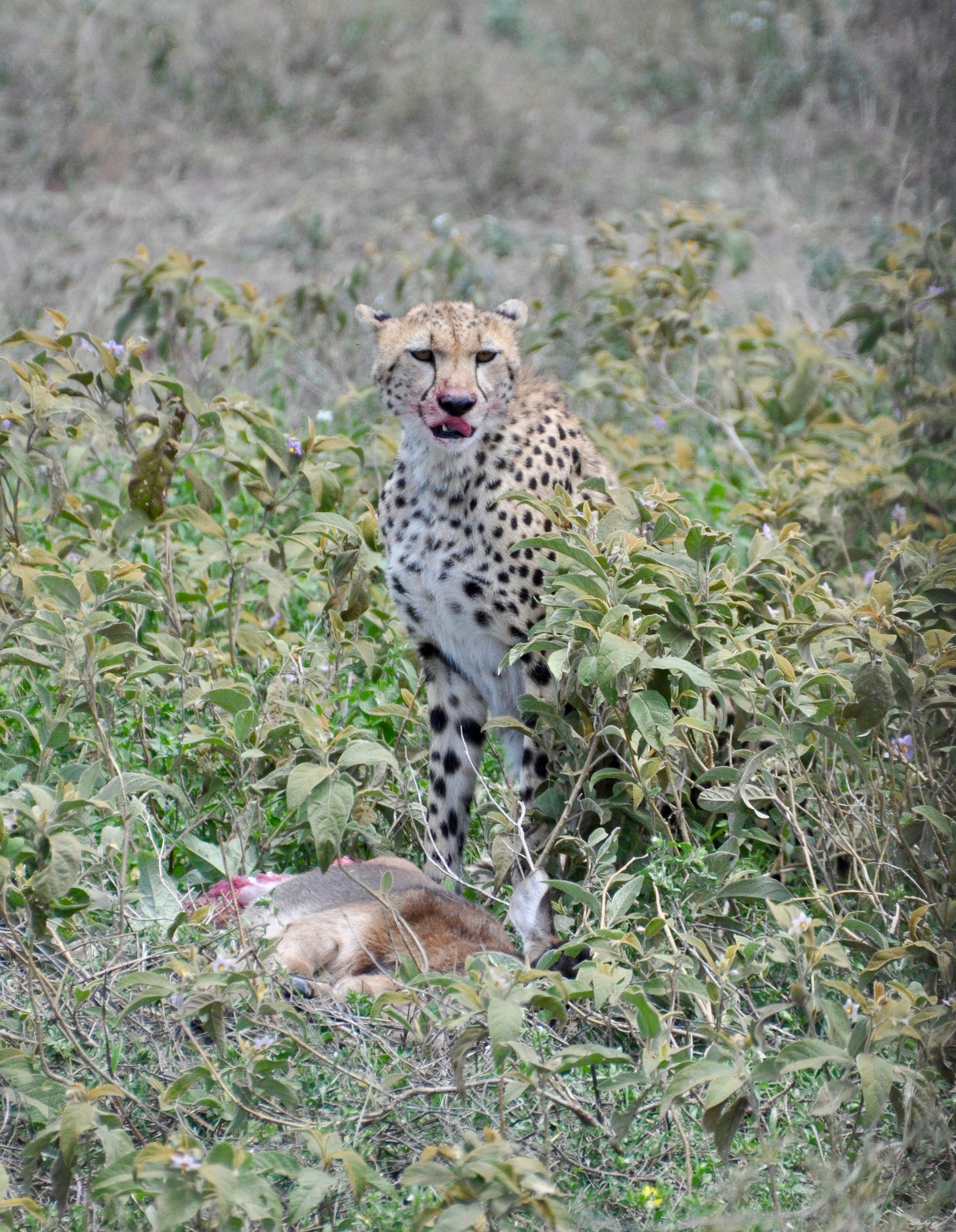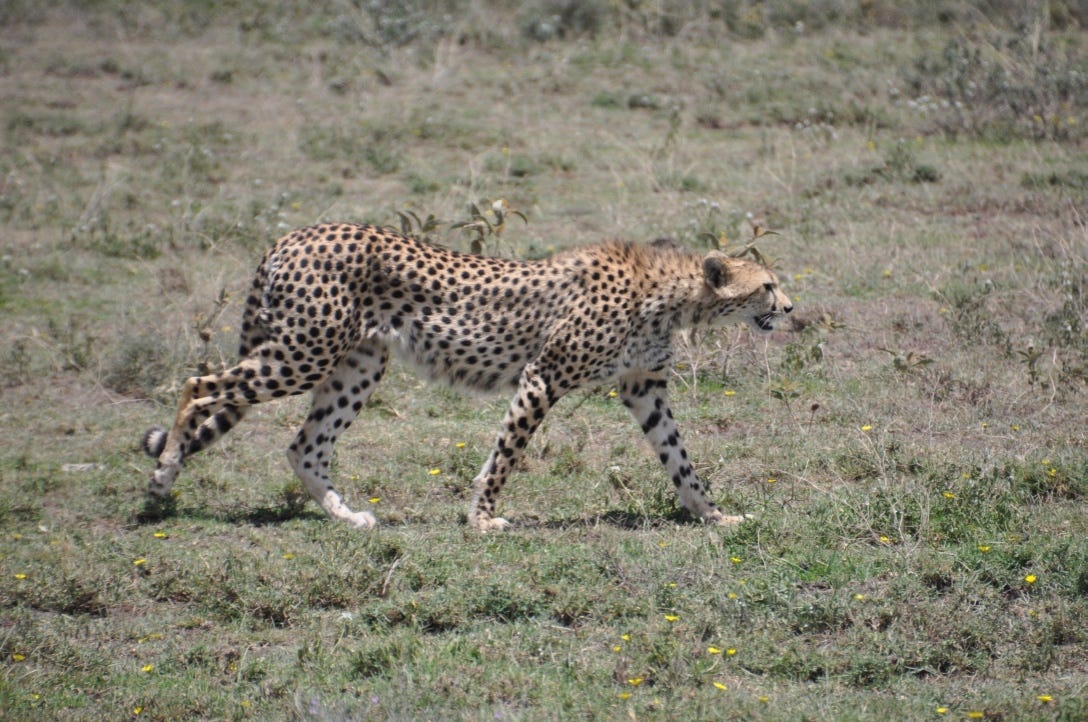Welcome to Being Animal. This newsletter explores the intricacies of human-animal relationships. Through personal stories, commentary on current events, and thought-provoking debates, I hope to challenge your assumptions and deepen your understanding of how animals are treated in our society. How we treat animals matters— for our own health, for our planet, and for our sense of morality and humanity.
I want to make the world a better place for animals. To do this, we have to change how we think about animals. This week, I write about what it means to glorify predation, and how so many humans share the idea that it is more natural to kill than to show mercy.
Through my binoculars, I spotted a cheetah’s distinctive head popping out of dense shrubbery. It was surveying a herd of wildebeest, which stretched out nearly as far as the horizon. Its eyes scanned the plain, biding time, assessing its options.
Suddenly, the cheetah stood up and began to walk out of the thicket, head low, eyes focused. It was so fluid, this movement, so smooth. I held my breath.
I followed the cheetah’s path with my binoculars, and my stomach lurched as I saw what it was moving towards.
A baby wildebeest had fallen behind the herd. It was moving slowly, distracted or unable to keep up, and the gap between it and the rest of the herd had grown. I shifted my binoculars back to the cheetah.
Effortlessly, the cheetah slid into a jog, and then a sprint. The wildebeest saw it coming and started running, too. But it was no match, in speed, agility, or strength.
The cheetah leapt at the weak creature, taking it down in one fell swoop as it sunk its jaw around the wildebeest’s neck. The victim’s legs sprawled akimbo in the air as the cheetah’s teeth clamped down on its neck.
Death was quick, but not instant. The frantic movements of the wildebeest’s death throes slowed, and within a few languid seconds its legs drooped to the ground in defeat. The life drained from its eyes and muscles.
It went still.
The cheetah didn’t let go of the creature’s neck yet, but stood up and dragged its body by the neck into the thicket nearby. Only then did the cat let go of its prey. Only then did the cat use its teeth to shred the wildebeest’s skin, tear out sinew and tissue, and eat.
I watched all of this, completely dumbstruck. How beautiful the cheetah was, how smooth and powerful and graceful. How horrifying the wildebeest’s death was, how violent and tragic, as its family walked away, looking back but unable to help.
It’s the circle of life, as the saying goes. Life takes death to sustain it.
The cheetah looked up as I peered at it through magnifying lenses. It swiveled its head around, making sure it was safe to be still and eating on this ever-changing arena of a landscape. It spotted us in our truck, and it paused, blood soaking its whiskers and nose. It licked its lips and stared back at us, before deciding we weren’t a threat and dipping its head back down to its fleshy meal.
Tears were in my eyes, and I was equally captivated by the majesty of what I just witnessed as by the tragedy of what I just saw. One creature did what it needed to for survival; another suffered the ultimate cost of being slow, small, and weak.
And me? I was just watching, a side character to the drama unfolding in the wild before me.
This is the image of predation and meat-eating so many humans hold in their mind: a battle of skill, a necessity for survival, a natural process that is part of the circle of life. Humans like to fancy ourselves at the top of the food chain, apex predators, entitled to anything we want to eat by the nature of our primacy. And this ideal of predation underscores a lot of our food system and meat production today.
A common argument in response to veganism goes something like this:
“It’s natural to eat meat. We always have.”
“Cavemen ate meat. It’s in our genes, and we are designed to eat animal protein.”
“What would you do if you were stranded on a desert island and the only thing to eat was a live rabbit/chicken/duck? Wouldn’t you kill it?”
I’m going to call these variations the “Cavemen Ate Meat” argument. The idea embedded in all of them is that predation is part of who we are as human animals; it’s part of our DNA, and we are hard-wired to need protein from a kill. It is more natural to eat meat than to abstain. In the face of thousands of years of meat-eating, veganism seems a little fad-like, a modern hippie-dippie rebellion from our true animal, carnivore selves, idealistic and detached from reality.
I’ll start with the most obvious response: we aren’t cavemen or wild animals. We are modern-day humans living in 2024; if you’re reading this, you have the internet at your disposal, which is proof enough that something drastic has changed.
Our food system in the United States bears no resemblance to the plains of Africa. Animals farmed for food have been genetically selected and modified to produce the most market-friendly meat selections, even when that causes suffering in life. Factory farms routinely employ tactics like debeaking, dehorning, tail docking, and more without anesthetic, in addition to widespread use of antibiotics, to combat risks and psychological harms from close confinement. When the animals are transported to slaughterhouses, they are crowded into trucks without food or water. And at slaughterhouses, the disassembly line of slaughter and processing is routine, constant, and swift. There is no risk to it; no hunting, no planning. Just cut after cut.
The logic of predation, in other words, does not translate from the savannah to the slaughterhouse.
Yet the connection between meat-eating and strength prevails in our society. We think that eating meat will make us strong, and eating meat is often treated as a marker of “manliness.” Despite mounting evidence that eating excessive amounts of meat is linked to cancer and other negative health outcomes, meat consumption has risen over the last century in the United States. We are being knife-fed by giant companies who continuously create more and more demand for their products through propaganda campaigns and manipulative dietary guidelines; to meet that demand, we raise and kill billions of animals every year.
There is nothing natural about this. When we buy a package of meat cut from the body of an animal who was bred, born, raised, and killed all within the confines of an industrial food system, we aren’t carnivores in the same way a cheetah is a carnivore. When we eat up to 40% more meat than dietary guidelines recommend, we aren’t operating within the rules of the wild where killing is a necessity. We are prey in the wilderness of the marketplace, where the only true predators are the corporations profiting from our fantasies.
But there’s hope.
Even as we insist we are natural carnivores, we humans also object that we are different from animals—greater than them, better than them, more than them. We have souls, spirits, minds, philosophies, religions, and more. We are more than our bodies.
In his speech titled “Man,” William Jennings Bryan highlighted this essential tension when confronted with the theory of evolution in the early 20th century:
“[M]an must be more than a perfect animal; he does not rise above the level of the beast if he permits his thoughts to rest entirely upon blood, and bone and muscle.”
To be human is to be animal. But to be human also has to be more than that.
So we shouldn’t be beholden to our cavemen past, or to our carnivore instincts. We can craft a new path, one rooted in mercy and compassion instead of outdated assumptions about the necessity of eating meat just for meat’s sake. We can choose what kind of omnivore we want to be. Just because we can do something (such as eat meat) doesn’t mean we have to. We have the capacity to choose something different.
I think it’s time to reconsider our role as human animals, leading with the law of love instead of the logic of predation. We have no entitlement to animal bodies simply because of the accident of our humanity. Maybe it was different in cavemen days, and it’s certainly different for apex predators in the wild.
But we aren’t cheetahs or lions or cavemen. We are human animals, endowed with remarkable ability and capacity for thought and rationality. We can choose something different based on the information we have today. And today, we know that numerous plant-based sources of protein exist. They are delicious, and they are better for the planet and for our health. We have other options, now that we have moved beyond our collective caveman era and enjoy things like the internet, toilets, and cell phones.
When I watched that cheetah take down the baby wildebeest, I was still eating meat. It felt strange, though, as I mourned the wildebeest at lunch that day while eating a chicken sandwich. What had I done to earn my meal, after all? What skill, hunger, or effort had gone into it?
None.
I kept eating meat for years after that experience. But I’ll never forget what it was like to encounter a true predator, and to realize—with discomfort—what a paltry excuse of a carnivore I made in comparison. My meat-eating was a default, not a need. With something like embarrassed resignation, I chewed my lunch. There was no pride in it. There was only habit.
This week, I encourage you to think about predation, power, and choice. If you wouldn’t kill a cow or pig or chicken yourself, what does it mean to be eating it? If you are comfortable saying human beings are more than animals, what does it mean to insist on our place at the top of the food chain, if not in word then by our choices? How can we reconcile our animal selves with our human ones?
I think we can lean into our humanity, choosing a better path for the planet, for our health, and for the animals with whom we share our world. We can simply choose to eat less meat. I cited a statistic above that most people eat 40% more protein than recommended; maybe this week, you could try to shift just 40% of your protein to be from plant-based sources. Beans, tofu, legumes, tempeh, and more are waiting for you.
It doesn’t have to be all or nothing; one meal is a great place to start.






